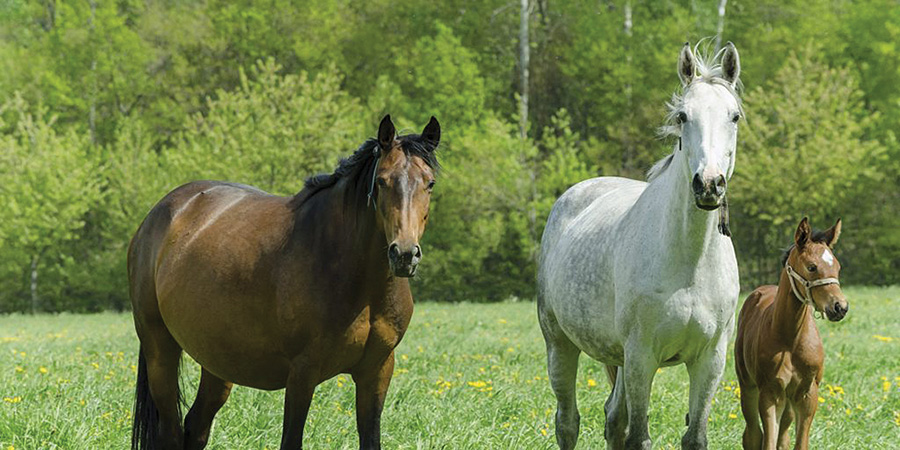
"Horse owners and breeders often face challenges with infertility in their mares,” says Dr. Tracey Chenier.
Guelph, ON April 10, 2024 - It is not uncommon for mares to have trouble getting pregnant because their uterus remains too inflamed after breeding. This condition is referred to as persistent breeding-induced endometritis (PBIE). Ontario Veterinary College researcher, Dr. Tracey Chenier is working to find out what causes this inflammation and how to treat it.
Broodmares and foal
"Horse owners and breeders often face challenges with infertility in their mares,” says Chenier. “Endometritis, an inflammation of the lining of the uterus, can affect mares leaving them unable to conceive or carry a pregnancy. We have been looking for ways to prevent or treat endometritis and improve mare reproductive performance.”
The study compared the uterus of normal horses and horses with PBIE before and after mating. In the randomized, blinded study, the uterus of mares with PBIE was infused with a drug called N-acetylcysteine (NAC) twelve hours prior to insemination to see if it would clear up the natural inflammatory response that
occurs post breeding sooner. NAC is a form of amino acid that has been used to treat conditions like chronic bronchitis in humans.

OVC researches persistent breeding-induced endometritis
In looking at the mares before insemination, they found that horses with PBIE had significantly more of a type of immune cell, called mast cells, in their uterus even before breeding than normal horses.
Mast cells are part of the body’s defense system, but they can also release chemicals that cause inflammation and tissue damage. After breeding, mares with PBIE had more inflammatory cells in their uterus than normal horses. The drug NAC did not reduce inflammation or the number of mast cells in horses with PBIE.
The research concludes that mast cells may play a role in the inflammation that affects horses with PBIE. It is suggested that the chemicals released by mast cells may make the uterus less able to contract after breeding. It is also hypothesised that mast cells might activate other cells that produce scar tissue in the uterus.
“A new clinical trial began in the summer of 2023,” says Chenier. “We are looking at new therapies that could reduce inflammatory proteins without the need for antibiotic use.”
Chenier and graduate student, Dr. Yazmin Osornio will be comparing uterine lavage, uterine infusion of platelet-rich plasma and oral supplementation with Omega-3 fatty acids, as potential treatments for the prolonged inflammation associated with persistent breeding-induced endometritis. The oral supplement is kindly being provided by Mad Barn and this clinical trial will continue through the summer of 2024.
If the prolonged inflammatory response in mares with PPIE can be reduced after breeding, it could lead to a better success rate for establishing pregnancy, which would be welcomed news for the horse breeding industry.
Equine Guelph supports a number of high-quality projects at the University of Guelph, by virtue of funding provided largely by the racing industry (Standardbred, Thoroughbred and Quarter horse organizations): the Horse Improvement Program from the Horsemen’s Benevolent and Protective Association, and the E.P. Taylor Foundation, started by veterinarians in the Thoroughbred industry, and now maintained in trust by the University and Equine Guelph.
About Equine Guelph:
Equine Guelph is the horse owners' and care givers' Centre at the University of Guelph in Canada. It is a unique partnership dedicated to the health and well-being of horses, supported and overseen by equine industry groups. Equine Guelph is the epicentre for academia, industry and government - for the good of the equine industry as a whole. For further information, visit www.equineguelph.ca.
Story by: Jackie Bellamy-Zions, Equine Guelph
Web Link(s):
Story web link: https://thehorseportal.ca/2024/03/researching-infertility-in-mares-due-to-endometritis/


